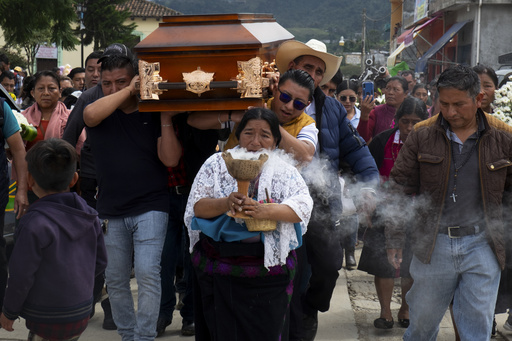
Community Grieves the Loss of Priest Marcelo Pérez in Chiapas
On Monday, a large crowd gathered to pay respects to Catholic priest Marcelo Pérez, an advocate for Indigenous communities and agricultural workers, who was tragically murdered in Chiapas, a southern state in Mexico. This incident has stirred sentiments of inevitable tragedy in a region plagued by rampant drug cartel violence that has displaced countless residents.
The memorial took place in San Andrés Larrainzar, close to San Cristóbal de las Casas, where Pérez lost his life on Sunday. As a prominent peace activist in this violence-stricken area, Pérez, aged 50, dedicated his life to fostering peace and understanding. The remembrance service included prayers in both Spanish and Tzotzil, the Indigenous language he was fluent in.
Despite facing persistent threats, Pérez remained committed to his work as a peace activist. Advocates for human rights lamented that he did not receive the level of government protection necessary to ensure his safety. The Fray Bartolomé de las Casas Human Rights Center emphasized the need for the government to address the ongoing risks he faced. “For years, we have urged the Mexican government to respond to the threats and aggressions directed at him, yet no measures were ever taken to protect his life and wellbeing,” the center stated.
As of now, details regarding his assailants remain unclear, with President Claudia Sheinbaum merely stating that “investigations are underway.” However, observers note that Pérez’s commitment to mediation and peace might have incited the ire of one of the two drug cartels currently competing for dominance in Chiapas, a critical corridor for drug and migrant trafficking.
The rights center highlighted that “Father Marcelo Pérez constantly faced threats and violence from organized crime groups,” underscoring that his death is symptomatic of a growing crisis of violence against civilians in Chiapas.
In recent years, the Sinaloa and Jalisco cartels have engaged in brutal conflicts, leading to the deadly targeting of entire families and coercing villagers into taking sides. Numerous residents have sought refuge in neighboring Guatemala to escape this peril.
Cardinal Felipe Arizmendi, a former bishop in the region, has voiced that authorities need to implement strategies to disarm these violent groups. He expressed that the government should not wait for victims to come forward, as many are too fearful to do so. “They need an effective plan to tackle these groups,” he urged.
Pérez’s murder, alongside other acts of violence in Sinaloa and the recent killings of migrants by the military, has placed additional scrutiny on the government’s handling of crime. Sheinbaum, who assumed office on October 1, has indicated her intention to continue the previous administration’s approach of avoiding direct confrontations with drug cartels, a strategy that has not managed to alleviate the violence effectively.
As Cardinal Arizmendi poignantly noted during Pérez’s memorial, “This is indicative of the overall situation in the country. The authorities can’t claim that everything is alright in Mexico. This strategy is not yielding positive outcomes.”
According to the state prosecutors’ office, Rev. Pérez was fatally shot by two gunman while sitting in his van shortly after he had conducted Mass. Over his two-decade tenure in the community, he was recognized as a mediator in numerous conflicts within a region riddled with crime and land disputes. Pérez organized several marches advocating against violence, which ultimately led to multiple death threats against him.
The U.N. Human Rights Office confirmed that Pérez represents the seventh human rights activist to be killed in Mexico as of 2024.
